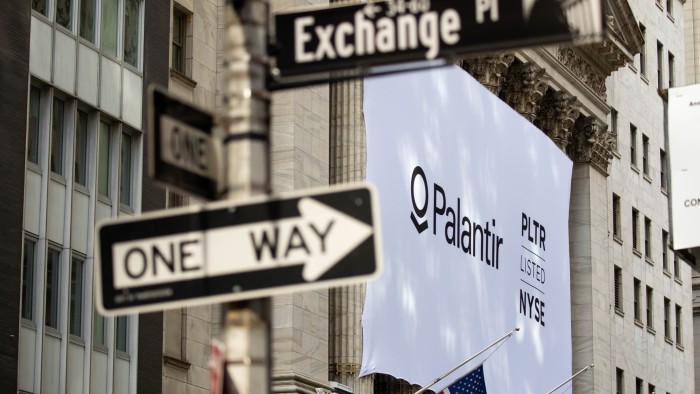Unlock the Editor’s Digest for free
Roula Khalaf, Editor of the FT, selects her favourite stories in this weekly newsletter.
Palantir’s growth is the stuff of dreams; its valuation is the stuff of fantasy. The data analytics company reported a 48 per cent increase in sales for the second quarter of 2025, a blistering pace for a company more than 20 years old. But a share price that has increased sixfold in a year suggests common sense has left the building.
Without question, customers want what Palantir is selling. The company run by Alex Karp and co-founded by Peter Thiel develops software for businesses and governments, notably Uncle Sam, to sift and crunch disparate data. Uses range from detecting mortgage fraud and making breakfast cereal to tracking migrants and guiding drone strikes.
The rate of adoption is dizzying, especially now artificial intelligence is part of the pitch. Palantir increased the ranks of its non-government US customers by 64 per cent over the past year. Sales to those clients almost doubled. There’s a competitive dynamic at play: fear of being obliterated by better-tooled rivals is one of Palantir’s most powerful marketing strategies, delivered bombastically to executives and heads of state alike.
But Palantir is an example of how it’s possible to be a successful company at a nonsensical price. Its enterprise value of about $360bn is around 70 times forecast revenue for the next 12 months, according to LSEG. That’s exuberant in the extreme. None of Salesforce, Tesla, Alphabet, Meta Platforms, and even the meme-stock-like mobile ad firm AppLovin managed even half that valuation multiple during this century.
Karp justifies the mania — when not snarking at the “haters” — by pointing out Palantir’s exceptionalism. For example, the company likes to flaunt its performance measured by the “rule of 40”, a Silicon Valley favourite that adds together a company’s sales growth and operating margin. A score of over 40 is desirable. Palantir’s, by its own measurement, is 94.
That’s a little disingenuous, since it ignores the large non-cash cost of paying staff in stock, which soaks up around one-sixth of revenue. Use the standard accounting measure of operating profit, and Palantir’s score falls, albeit still to a very impressive 75. Meta lands in the 60s; Microsoft in the 50s.
Another way to think about it: what would it take for Palantir’s valuation to make sense? Karp told investors on Monday he thinks he can increase the company’s US revenue tenfold in five years, implying a level of $13bn. Assume also that government and foreign revenue doubles, giving the group a total of $18bn in sales. Its valuation today would then be 20 times revenue, the highest level ever attained by Alphabet and Tesla.
That is still a tall order. Karp’s investors are not only betting that he can increase revenue like the clappers for five years but that they should value his company as if he already has. Palantir’s schtick is that it helps its customers make rational, value-creating decisions. In this case, the market could use some help in that department too.
john.foley@ft.com


